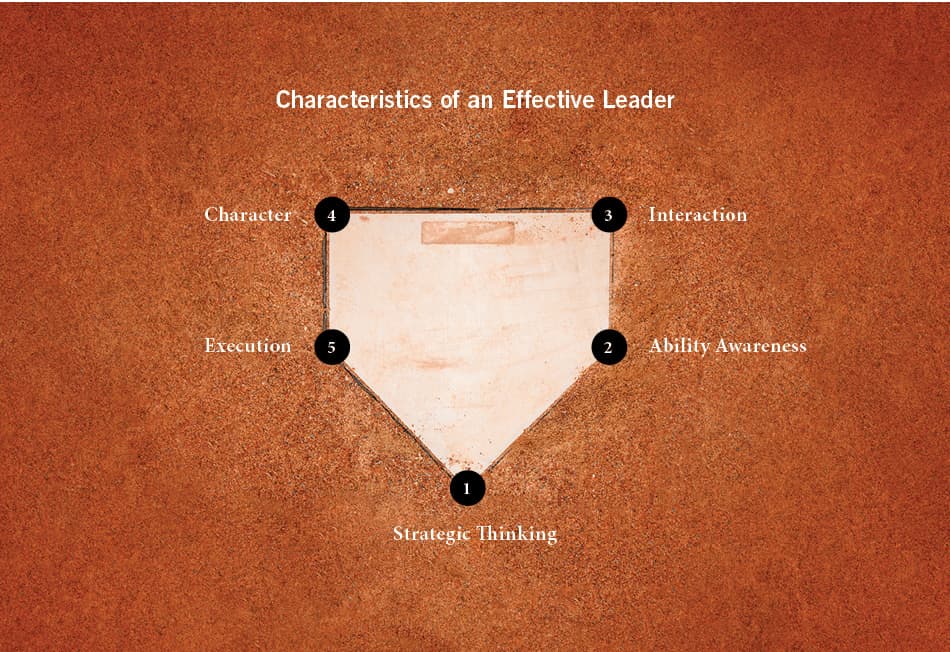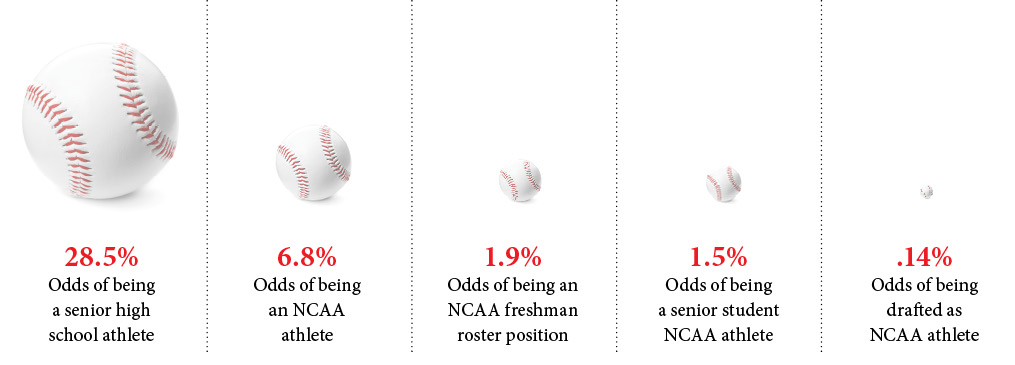- Strategic Thinking: Do I anticipate the future and provide a compelling vision?
- Ability Awareness: Do I understand and develop my own talent and the talents of others?
- Interaction: Do I work well and communicate effectively with others?
- Character: Do I understand how my behavior affects others? Am I a leader others want to follow?
- Execution: Do I achieve desired results?
Baseball is a sport with many great business parallels. In baseball, leaders create an initial lineup strategy. They build a strong and cohesive team, nurturing talent to maximize strengths and minimize weaknesses. They make on-the-fly adjustments to an unexpected injury or trade. They show great character under pressure by defending a player when the umpire makes a bad call or when their team is in a slump. Baseball requires a well-rounded and well-developed set of leadership skills to get a team to peak performance and keep it there.
Here are lessons from the baseball diamond that leaders can use to build — and sustain — their own championship team:
1. Strategic Thinking: Keep a Deep Bench
Injuries and trades are common in baseball, and every manager needs to be prepared. Nobody wants to think the star player may be sidelined by a season-ending injury, or that an enticing offer from another team could compel him to move. To keep your team competitive, you must anticipate the future so you are prepared to respond when needed. In business, succession planning is an important practice. Not just for your star player, but across the organization. Are you constantly seeking out opportunities to develop younger talent? If not, you should be.

2. Ability Awareness: Develop Your Talent, From the Farm Team to the Big Leagues
If a leader wants to have his pick of the top talent for his organization, he can’t rely on trades alone. Trades are expensive; players have been trained on totally different systems. That’s not to say that bringing in external talent is always a bad idea, but developing talent from within is critical to remaining league competitive. That’s why a key characteristic of strong leaders is their ability to develop the talents of others. That type of development isn’t done in the big leagues; it’s done in the farm league.
A farm league provides the venue to develop and mold talent that may be young and a little rough around the edges. It’s a forum to build the whole player, providing a safer space to develop a keen understanding of the game and strategy, rather than just relying on the raw talent of being a great slugger whose star power burns out quickly. The reality is only 9.4 percent of college athletes will ever play for a professional baseball team, and fewer will ever get to the majors. But being willing to make this type of short-term investment allows you to identify the top talent who will really make an impact when they’re called up to the big leagues. Use the farm league to get your players thinking like pros, so they can start acting like pros.
To get started, identify your long-term talent needs and understand the talents (and blind spots) your collective organization brings to the table. Then, shape your program. It can be rigorous internal or external training programs, job rotations or other experiential learning events. The important thing is to get budding leaders into the program and coach, coach, coach! This provides a forum for budding talent to develop their strengths, understand their weaknesses and ultimately create loyalty to the organization. By the time the players are in the business big leagues, they know the ropes and how to be successful.
In today’s economy, business is all about the people, the players. The winners — both individuals and companies — are identifying internal talent and looking for ways to build on that talent. This takes an investment of time and money, but as research by Wharton management professor Matthew Bidwell shows, “workers promoted into jobs have significantly better performance for the first two years than workers hired into similar jobs and lower rates of voluntary and involuntary exit … (but) external hires are initially paid around 18 percent more than the promoted workers.”
If you are in a business that cannot afford years of lag time waiting for external talent to catch up to your style of play, you must create your own farm league.

3. Interaction: Bad inning? Focus on the Details
Picture this: It’s the bottom of the ninth inning, two outs, bases are loaded, back-to-back players just walked, and the star hitter steps up to the plate. The issue? It’s your pitcher on the mound, and your team is hanging on to the lead by the slimmest of margins. What do you tell him to do? The obvious answer is, “Strike him out!” But his curve ball isn’t dropping, and his fastball isn’t so fast. So what now?
Sometimes the goal is very clear, but the process to get there is overwhelming. Self-doubt creeps in and a change is needed. Instead of focusing on the big picture, help your player regain his concentration by getting him to focus on one small detail, such as where his foot should fall on the mound or the position of his fingers as he releases the ball. As a leader, you focus on “the will.” You get your pitcher to focus on “the way.” And together, you’ll get through the inning with your lead intact.
The same is true in the workplace. At one time or another, team members are going to get in a tough situation, and it’s not always clear how they’ll move forward. They get so bogged down by the goal, they lose sight of how to do it. If you see this happening, step in and remind them to look at the details. Remain focused on the goal, but help them identify one small thing they can do to get unstuck. It can be as simple as moving from their desk to a conference room for a change of scenery, having a quick phone conversation to cover one detail they’ve been poring over, or even stepping away from the laptop and taking a few deep breaths. As the leader, keep an eye out for those situations and help your player work through it.
4. Character: Don’t Be Afraid to Pull Your Pitcher
It’s impossible to be perfect every minute of every day. Everyone has off days. Sometimes that off day happens at a critical time, when the game is on the line. It’s your job as the leader to recognize that in some instances, no matter the amount of coaching, that person just isn’t the right fit. In those situations, it’s OK to pull your pitcher. Let him go to the locker room, cool off, but always catch up with him so he’s stronger next time he takes the mound.
In business as in baseball, it’s the role of the leader to make the tough calls. If a must-succeed project has hit a major snag and the point person on your team is falling into a tailspin, and it’s obvious that the individual’s recovery is impossible, it’s your responsibility to deal with the situation swiftly and fairly. Pull the person from the project, being careful not to ostracize him or her. Once removed from the pressure and stress of the situation, talk about what happened — from both of your perspectives — and what you both should do differently the next time. This is your opportunity to turn a short-term negative into a long-term positive. By demonstrating character in tough situations and communicating both the good and the bad effectively, you will create a stronger and more cohesive team that respects you, their leader.
5. Execution: Moneyball to Achieve Success
As shown in the Moneyball story, basic stats are not always an indicator of overall team success. Not every player will have stellar statistics such as batting average, RBIs or stolen bases, but you can find value in areas that aren’t the most obvious. Maybe they’re great at getting on base, or at hitting the ball to the perfect spot for a sacrifice fly. To maximize runs scored, players have to operate as a team, complementing each other’s strengths and compensating for weaknesses.
The same applies in business. Look to create a balanced team that brings unique skill sets to the table that are right for your organization. Have great strategists? Partner them with strong executors to get fast, value-driven results. When they’re partnered, they score runs and outshine an individual slugger any day. Do this enough and you’ll have a winning season, and maybe even win a World Series or two.
